The demand for casein peptone in Japan is valued at USD 20.6 million in 2025 and is projected to reach USD 27.1 million by 2035, reflecting a CAGR of 2.8%. During the early phase of the forecast (2025 to 2030), demand will grow steadily, increasing from USD 20.6 million to approximately USD 23.6 million by 2030. This steady growth is driven by the rising applications of casein peptone in industries such as biotechnology, pharmaceuticals, and food. The incremental increase during this period highlights its growing role in cell culture media, fermentation, and other advanced applications across these sectors.
Between 2030 and 2035, the pace of growth experiences a notable shift. Demand will reach USD 27.1 million by 2035, as applications of casein peptone expand in more specialized fields, such as vaccine production and personalized health solutions. The growth pattern becomes steeper during this period, reflecting a surge in adoption due to increased research and development in biotechnology. The turning point around 2030 signals stronger growth momentum, driven by technological advances and the broader use of casein peptone in cutting-edge scientific applications. This will ensure the continued expansion of the market through 2035.
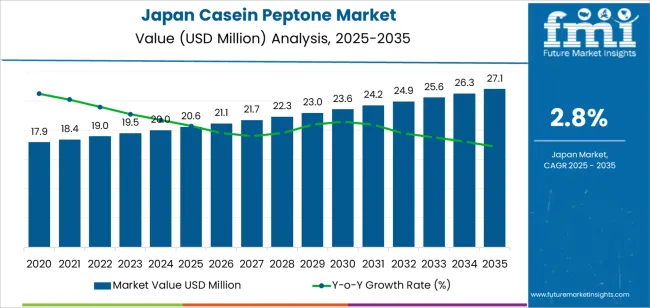
The growth curve for Casein Peptone demand in Japan from 2020 to 2035 exhibits a steady and consistent upward trend, reflecting gradual market expansion. From 2020 to 2025, the market grows from USD 17.9 million to USD 20.6 million, representing a steady, moderate increase of USD 2.7 million. This growth trajectory indicates stable demand driven by continued use of casein peptone in sectors like biotechnology, pharmaceuticals, and food. The curve during this phase is shaped by incremental increases in market adoption and application diversification, reflecting the compound annual growth rate (CAGR) of 2.8%.
From 2025 to 2030, the market continues its upward movement, reaching USD 21.1 million. The growth curve remains smooth, indicating continued but steady adoption across various industries. In the later years of the forecast, from 2030 to 2035, the market further expands to USD 27.1 million, indicating a continued positive slope. The gradual nature of this growth curve suggests that while the overall demand for Casein Peptone will increase, the market will likely experience less volatility, with a focus on sustained, stable growth rather than rapid, short-term expansion. The growth pattern indicates a mature, steady market trajectory driven by evolving industry requirements.
| Metric | Value |
|---|---|
| Industry Value (2025) | USD 20.6 million |
| Forecast Value (2035) | USD 27.1 million |
| Forecast CAGR (2025 to 2035) | 2.8% |
The demand for casein peptone in Japan has been shaped by historical growth in biotechnology, pharmaceutical research and industrial fermentation. Development in cell culture media, diagnostics and vaccine manufacturing prompted adoption of high purity casein peptone as a nutrient source for microorganisms. Growth factors included expansion of laboratory infrastructure, increasing regulatory focus on microbial culture quality, and rising usage in enzyme production and industrial fermentation processes. Japan’s established dairy protein extraction capabilities further supported availability of casein derived peptones in local supply chains. While competition from plant derived alternatives existed, the supply reliability and amino acid profile of casein peptone kept the product relevant in microbial and fermentation applications.
Looking ahead, future demand in Japan is expected to be driven by ongoing advancements in biopharmaceutical production, increasing use of precision fermentation and growing interest in diagnostic media related to infectious disease research. As vaccine manufacturing and biologics continue to expand, the need for optimized growth media such as casein peptone will escalate. In addition, stringent traceability and quality standards will favour premium grade casein peptone in the Japanese market. While substitution risk from non animal peptones remains a restraint, the continual growth of Japan’s biotech ecosystem and fermentation based production ensure sustained demand for casein peptone over the coming years.
The demand for casein peptone in Japan is driven by both application and type. Key applications include diagnostic media production, enzyme production, vaccine production, industrial fermentation, and biomass production. Among these, diagnostic media production holds a significant share at 26%, reflecting the increasing need for casein peptone in medical and laboratory applications. In terms of type, hydrolyzed casein peptone dominates, accounting for approximately 57% of the demand, due to its broad use in various industries. Partially hydrolyzed casein peptone also plays a role in specific applications, but its share is relatively smaller compared to fully hydrolyzed variants.
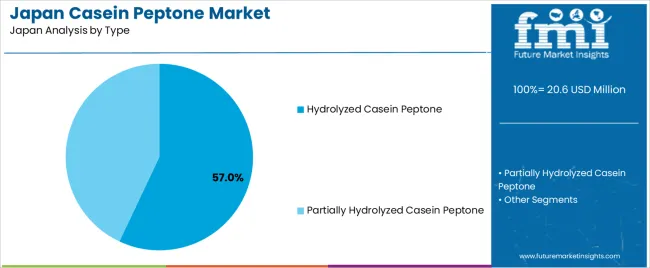
Hydrolyzed casein peptone leads the demand in Japan, representing 57% of the total market. This high demand is driven by its enhanced nutritional profile and its wide range of applications in industrial fermentation, enzyme production, and vaccine production. Hydrolyzed casein peptone provides the necessary amino acids and peptides that support microbial growth, making it crucial in processes such as the production of enzymes and vaccines. Its role in providing optimal growth conditions for microorganisms has made it an essential ingredient in various biotechnology and pharmaceutical sectors.
The preference for hydrolyzed casein peptone can also be attributed to its versatility in applications beyond industrial fermentation, such as in the cultivation of microorganisms used in diagnostics and biotechnology. The growing demand for high-quality diagnostic media and the development of advanced enzyme-based processes have increased the need for this specific type of casein peptone. As the biotechnology sector continues to expand in Japan, hydrolyzed casein peptone is expected to maintain its dominant position due to its effectiveness and broad applicability across different industrial and medical applications.
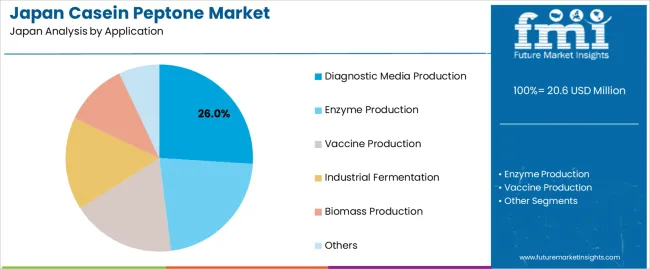
Diagnostic media production represents approximately 26% of the total demand for casein peptone in Japan. This demand is primarily driven by the growing need for diagnostic tools and tests in healthcare and medical research. Casein peptone, particularly in its hydrolyzed form, provides essential nutrients that support the growth of microorganisms used in diagnostic assays, making it a critical component in microbiological media. The increasing prevalence of diseases and the need for rapid diagnostic testing have further contributed to the rising demand for casein peptone in this application.
The growth of diagnostic media production in Japan is also supported by advancements in medical research and the increasing use of microbiological techniques for disease detection. As Japan continues to invest in healthcare infrastructure and biotechnology, the demand for high-quality casein peptone for diagnostic purposes is expected to increase. The essential role of casein peptone in developing accurate diagnostic media ensures that it remains a key ingredient in the medical and laboratory sectors, helping to meet the evolving needs of healthcare providers and researchers.
The demand for casein peptone in Japan is shaped by domestic developments in biotechnology, pharmaceuticals, and industrial microbiology. Key drivers include expanded vaccine production infrastructure, growth in diagnostic microbiology labs, and rising fermentation based manufacturing. Restraints consist of rising raw material costs, stringent quality requirements, and competition from plant based peptones. Trends feature higher purity standards for culture media, integration of casein peptone into functional food applications, and an emphasis on traceability in sourcing. Together, these factors determine the path of casein peptone adoption in Japan’s specialized ingredient market.
Japan’s increasing investment in vaccine development and biopharmaceutical production has raised the need for reliable culture media ingredients. Casein peptone serves as a nutrient source in microbial fermentation and cell culture systems. Japanese companies expanding enzyme and biologic manufacture rely on high quality peptones to ensure consistent yields. Growth in diagnostic microbiology labs within Japan is generating higher consumption of media containing casein peptone. As biotechnology players in Japan scale up production and testing capacities, this domestic momentum supports casein peptone demand.
In Japan, casein peptone production faces pressure from rising milk protein costs and the complexity of high purity processing. Japanese users must meet rigorous domestic and international quality standards, which increase manufacturing overhead. Some formulators in Japan shift toward plant derived peptones due to allergen and animal origin concerns, reducing exclusive dependency on casein based versions. Smaller Japanese micro media firms may find these cost and sourcing barriers restrictive. These factors act to moderate uptake of casein peptone within Japan’s specialized ingredient segment.
Japanese formulators are using casein peptone beyond traditional microbial culture media into functional food and supplement applications where amino acid rich hydrolysates are valued. Japanese regulatory focus on traceability and food grade certification is driving suppliers to offer casein peptone batches with transparent origins and documentation. In Japan, the trend toward premium culture media products mean higher purity casein peptone grades are gaining preference. These application shifts and regulatory demands are reshaping how casein peptone is positioned in Japan’s ingredient ecosystem.
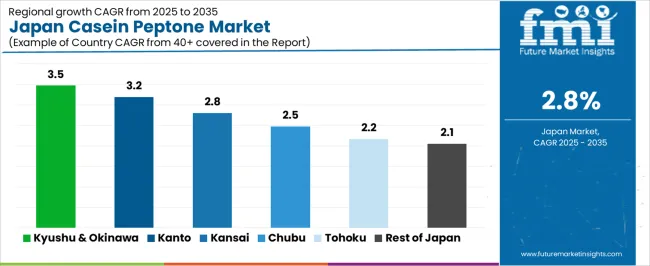
| Region | CAGR (%) |
|---|---|
| Kyushu & Okinawa | 3.5% |
| Kanto | 3.2% |
| Kinki | 2.8% |
| Chubu | 2.5% |
| Tohoku | 2.2% |
| Rest of Japan | 2.1% |
The demand for casein peptone in Japan varies across regions, with Kyushu & Okinawa showing the highest growth at 3.5 % CAGR. This region’s relatively higher rate is influenced by local biotech and pharmaceutical research activity, along with emerging industrial fermentation efforts. Kanto follows at 3.2 %, supported by its dense concentration of research institutions and manufacturing facilities requiring high quality culture media. In Kinki the CAGR of 2.8 % reflects a moderate expansion tied to industrial and academic use. Chubu’s 2.5 % growth is driven by regional manufacturing diversification. The Tohoku and Rest of Japan regions record lower growth at 2.2 % and 2.1 % respectively, reflecting smaller scale facilities and slower biotech adoption.
In Kyushu & Okinawa, the demand for Casein Peptone is growing at a CAGR of 3.5% through 2035. This growth is driven by the increasing use of casein peptone in biotechnology and microbial fermentation processes. The expanding pharmaceutical and food sectors in the region are also contributing to the demand for high-quality peptones. With the growing focus on research and development, especially in biotechnology and pharmaceutical industries, Kyushu & Okinawa are seeing an uptick in the use of casein peptone as a key ingredient in culture media formulations.
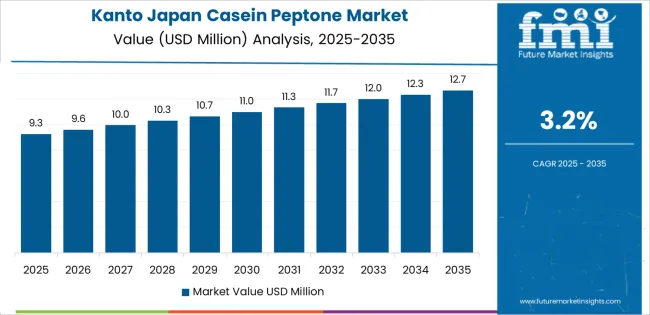
In Kanto, the demand for Casein Peptone is projected to grow at a CAGR of 3.2% through 2035. Kanto’s well-developed pharmaceutical and biotechnology industries are key drivers of this demand. As biotechnology research advances and the pharmaceutical industry expands, the demand for high-quality culture media ingredients like casein peptone continues to rise. Kanto’s strong research and development capabilities, coupled with its robust healthcare infrastructure, further support the growing need for peptones in microbial culture media formulations used in research and production processes.
In Kinki, the demand for Casein Peptone is expected to grow at a CAGR of 2.8% through 2035. The region’s growing pharmaceutical and food sectors, along with its increasing focus on biotechnology, are contributing to the demand for casein peptone. As Kinki continues to develop its research capabilities, especially in medical and pharmaceutical fields, the need for high-quality peptones in microbial culture media grows. Additionally, local manufacturers are adopting casein peptone to meet the increasing demand for research materials and to support fermentation processes in various industries.
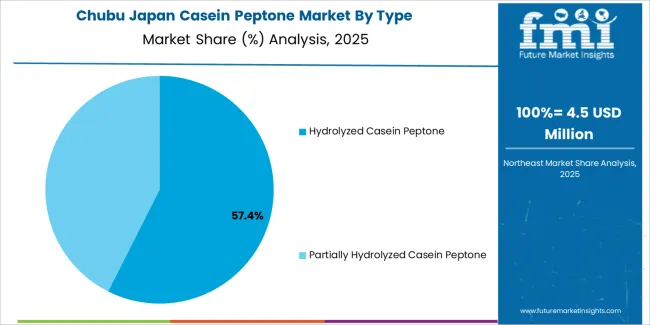
In Chubu, the demand for Casein Peptone is projected to grow at a CAGR of 2.5% through 2035. The region’s pharmaceutical and biomanufacturing sectors are steadily increasing their use of casein peptone for microbial culture media in research and production. While the demand in Chubu is slightly lower than in other regions, the growth is still driven by the region's advancing healthcare and biotechnology industries. Additionally, Chubu’s expanding food industry, which is increasingly adopting fermentation processes, is also contributing to the demand for high-quality peptones in the region.
In Tohoku, the demand for Casein Peptone is expected to grow at a CAGR of 2.2% through 2035. While the demand is relatively modest compared to other regions, Tohoku's growing interest in biotechnology and life sciences is contributing to increased use of casein peptone. The region’s expanding pharmaceutical and agricultural industries are seeking high-quality peptones for microbial fermentation and research. As Tohoku continues to focus on improving its research infrastructure, the adoption of casein peptone in fermentation and culture media will rise, although growth will be slower than in more industrialized regions.
In the rest of Japan, the demand for Casein Peptone is projected to grow at a CAGR of 2.1% through 2035. While growth in these regions is slower, the demand for casein peptone is being driven by an increase in research activities, particularly in the agricultural and biotechnology sectors. Local manufacturers are adopting casein peptone in microbial fermentation processes, supporting the regional demand. As interest in sustainable and natural ingredients grows in various industries, casein peptone usage is expected to see gradual growth in these areas.
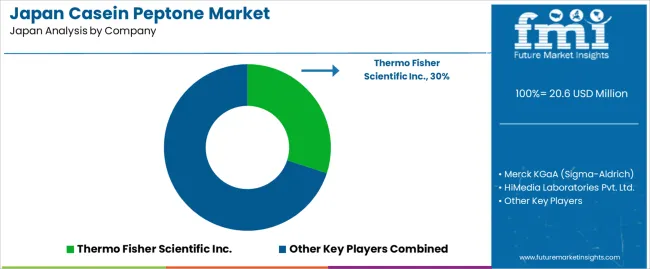
The demand for casein peptone in Japan is primarily driven by the country’s robust biotechnology, pharmaceuticals, and food industries. Casein peptone, a vital ingredient in microbiological media, is used in various applications, including the cultivation of bacteria for research, diagnostics, and food safety testing. Japan's increasing focus on biotechnology innovation, pharmaceutical research, and the growing demand for high-quality probiotics and nutraceuticals are key factors propelling the market. Additionally, the expanding food and beverage sector, particularly in fermentation processes, relies heavily on casein peptone for the production of enzymes, flavors, and other additives, further driving its demand.
Key players such as Thermo Fisher Scientific Inc., Merck KGaA (Sigma-Aldrich), HiMedia Laboratories Pvt. Ltd., Neogen Corporation, and Solabia Group (Biospringer, Peptone Division) are instrumental in shaping the casein peptone market in Japan. Thermo Fisher Scientific and Merck KGaA are leading the market with their extensive portfolios of laboratory-grade peptones used in microbiological and biotechnological applications.
HiMedia Laboratories and Neogen Corporation cater to the growing demand for high-quality peptones in food safety and diagnostic applications. Solabia Group, through its Biospringer division, provides peptones for industrial fermentation, enhancing Japan’s food production capabilities. These companies, both global and regional, continue to innovate and expand their offerings to meet the diverse needs of Japan’s rapidly growing life sciences and food industries.
| Items | Values |
|---|---|
| Quantitative Units (2025) | USD million |
| Application | Diagnostic Media Production, Enzyme Production, Vaccine Production, Industrial Fermentation, Biomass Production, Others |
| Type | Hydrolyzed Casein Peptone, Partially Hydrolyzed Casein Peptone |
| Region | Kyushu & Okinawa, Kanto, Kinki, Chubu, Tohoku, Rest of Japan |
| Countries Covered | Japan |
| Key Companies Profiled | Thermo Fisher Scientific Inc., Merck KGaA (Sigma-Aldrich), HiMedia Laboratories Pvt. Ltd., Neogen Corporation, Solabia Group |
| Additional Attributes | Dollar by sales by application, type, and region; regional CAGR and adoption trends; volume and value growth projections; increasing demand in biotechnology, pharmaceutical research, and food safety testing; growing applications in vaccine production, industrial fermentation, and personalized health solutions; rising need for high-quality probiotics and nutraceuticals; advancements in biotechnology and pharmaceuticals driving market demand; increased interest in diagnostic media and enzyme production. |
The demand for casein peptone in Japan is estimated to be valued at USD 20.6 million in 2025.
The market size for the casein peptone in Japan is projected to reach USD 27.1 million by 2035.
The demand for casein peptone in Japan is expected to grow at a 2.8% CAGR between 2025 and 2035.
The key product types in casein peptone in Japan are diagnostic media production, enzyme production, vaccine production, industrial fermentation, biomass production and others.
In terms of type, hydrolyzed casein peptone segment is expected to command 57.0% share in the casein peptone in Japan in 2025.






Our Research Products

The "Full Research Suite" delivers actionable market intel, deep dives on markets or technologies, so clients act faster, cut risk, and unlock growth.

The Leaderboard benchmarks and ranks top vendors, classifying them as Established Leaders, Leading Challengers, or Disruptors & Challengers.

Locates where complements amplify value and substitutes erode it, forecasting net impact by horizon

We deliver granular, decision-grade intel: market sizing, 5-year forecasts, pricing, adoption, usage, revenue, and operational KPIs—plus competitor tracking, regulation, and value chains—across 60 countries broadly.

Spot the shifts before they hit your P&L. We track inflection points, adoption curves, pricing moves, and ecosystem plays to show where demand is heading, why it is changing, and what to do next across high-growth markets and disruptive tech

Real-time reads of user behavior. We track shifting priorities, perceptions of today’s and next-gen services, and provider experience, then pace how fast tech moves from trial to adoption, blending buyer, consumer, and channel inputs with social signals (#WhySwitch, #UX).

Partner with our analyst team to build a custom report designed around your business priorities. From analysing market trends to assessing competitors or crafting bespoke datasets, we tailor insights to your needs.
Supplier Intelligence
Discovery & Profiling
Capacity & Footprint
Performance & Risk
Compliance & Governance
Commercial Readiness
Who Supplies Whom
Scorecards & Shortlists
Playbooks & Docs
Category Intelligence
Definition & Scope
Demand & Use Cases
Cost Drivers
Market Structure
Supply Chain Map
Trade & Policy
Operating Norms
Deliverables
Buyer Intelligence
Account Basics
Spend & Scope
Procurement Model
Vendor Requirements
Terms & Policies
Entry Strategy
Pain Points & Triggers
Outputs
Pricing Analysis
Benchmarks
Trends
Should-Cost
Indexation
Landed Cost
Commercial Terms
Deliverables
Brand Analysis
Positioning & Value Prop
Share & Presence
Customer Evidence
Go-to-Market
Digital & Reputation
Compliance & Trust
KPIs & Gaps
Outputs
Full Research Suite comprises of:
Market outlook & trends analysis
Interviews & case studies
Strategic recommendations
Vendor profiles & capabilities analysis
5-year forecasts
8 regions and 60+ country-level data splits
Market segment data splits
12 months of continuous data updates
DELIVERED AS:
PDF EXCEL ONLINE
Casein Peptone Market Report – Growth & Industry Trends 2025 to 2035
Demand for Casein Hydrolysate in Japan Size and Share Forecast Outlook 2025 to 2035
Japan Faith-based Tourism Market Size and Share Forecast Outlook 2025 to 2035
Japan Sports Tourism Market Size and Share Forecast Outlook 2025 to 2035
Japan Respiratory Inhaler Devices Market Size and Share Forecast Outlook 2025 to 2035
Japan Halal Tourism Market Size and Share Forecast Outlook 2025 to 2035
Japan Automated People Mover Industry Size and Share Forecast Outlook 2025 to 2035
Japan Automotive Load Floor Industry Analysis Size and Share Forecast Outlook 2025 to 2035
Japan Food Cling Film Market Size and Share Forecast Outlook 2025 to 2035
Japan Polypropylene Packaging Films Market Size and Share Forecast Outlook 2025 to 2035
Casein Market Analysis - Size, Share, and Forecast 2025 to 2035
Casein Hydrolysate Market Size, Growth, and Forecast for 2025 to 2035
Japan Probiotic Yogurt Market is segmented by product type, source type, nature type, flavor type, fat content, sales channel and key city/province through 2025 to 2035.
japan Tortilla Market - Growth, Trends and Forecast from 2025 to 2035
Japan Cosmetics ODM Market Analysis - Size, Share & Trends 2025 to 2035
Japan Automotive Turbocharger Market Insights – Demand, Size & Industry Trends 2025–2035
Japan Yeast Market Insights – Demand, Size & Industry Trends 2025–2035
Japan Green and Bio-based Polyol Market Insights – Demand, Size & Industry Trends 2025–2035
Japan Natural Food Color Market Trends – Growth, Demand & Forecast 2025–2035
Japan Coated Fabrics Market Growth – Trends, Demand & Innovations 2025–2035

Thank you!
You will receive an email from our Business Development Manager. Please be sure to check your SPAM/JUNK folder too.
Chat With
MaRIA